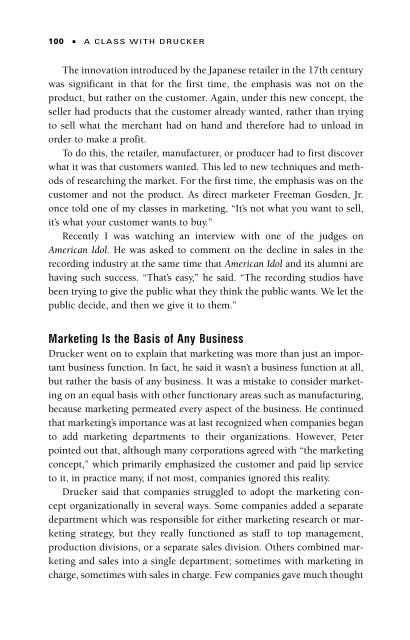A Class with Drucker - Headway | Work on yourself
A Class with Drucker - Headway | Work on yourself
A Class with Drucker - Headway | Work on yourself
Create successful ePaper yourself
Turn your PDF publications into a flip-book with our unique Google optimized e-Paper software.
100 ■ A CLASS WITH DRUCKER<br />
The innovati<strong>on</strong> introduced by the Japanese retailer in the 17th century<br />
was significant in that for the first time, the emphasis was not <strong>on</strong> the<br />
product, but rather <strong>on</strong> the customer. Again, under this new c<strong>on</strong>cept, the<br />
seller had products that the customer already wanted, rather than trying<br />
to sell what the merchant had <strong>on</strong> hand and therefore had to unload in<br />
order to make a profit.<br />
To do this, the retailer, manufacturer, or producer had to first discover<br />
what it was that customers wanted. This led to new techniques and methods<br />
of researching the market. For the first time, the emphasis was <strong>on</strong> the<br />
customer and not the product. As direct marketer Freeman Gosden, Jr.<br />
<strong>on</strong>ce told <strong>on</strong>e of my classes in marketing, “It’s not what you want to sell,<br />
it’s what your customer wants to buy.”<br />
Recently I was watching an interview <str<strong>on</strong>g>with</str<strong>on</strong>g> <strong>on</strong>e of the judges <strong>on</strong><br />
American Idol. He was asked to comment <strong>on</strong> the decline in sales in the<br />
recording industry at the same time that American Idol and its alumni are<br />
having such success. “That’s easy,” he said. “The recording studios have<br />
been trying to give the public what they think the public wants. We let the<br />
public decide, and then we give it to them.”<br />
Marketing Is the Basis of Any Business<br />
<str<strong>on</strong>g>Drucker</str<strong>on</strong>g> went <strong>on</strong> to explain that marketing was more than just an important<br />
business functi<strong>on</strong>. In fact, he said it wasn’t a business functi<strong>on</strong> at all,<br />
but rather the basis of any business. It was a mistake to c<strong>on</strong>sider marketing<br />
<strong>on</strong> an equal basis <str<strong>on</strong>g>with</str<strong>on</strong>g> other functi<strong>on</strong>ary areas such as manufacturing,<br />
because marketing permeated every aspect of the business. He c<strong>on</strong>tinued<br />
that marketing’s importance was at last recognized when companies began<br />
to add marketing departments to their organizati<strong>on</strong>s. However, Peter<br />
pointed out that, although many corporati<strong>on</strong>s agreed <str<strong>on</strong>g>with</str<strong>on</strong>g> “the marketing<br />
c<strong>on</strong>cept,” which primarily emphasized the customer and paid lip service<br />
to it, in practice many, if not most, companies ignored this reality.<br />
<str<strong>on</strong>g>Drucker</str<strong>on</strong>g> said that companies struggled to adopt the marketing c<strong>on</strong>cept<br />
organizati<strong>on</strong>ally in several ways. Some companies added a separate<br />
department which was resp<strong>on</strong>sible for either marketing research or marketing<br />
strategy, but they really functi<strong>on</strong>ed as staff to top management,<br />
producti<strong>on</strong> divisi<strong>on</strong>s, or a separate sales divisi<strong>on</strong>. Others combined marketing<br />
and sales into a single department; sometimes <str<strong>on</strong>g>with</str<strong>on</strong>g> marketing in<br />
charge, sometimes <str<strong>on</strong>g>with</str<strong>on</strong>g> sales in charge. Few companies gave much thought


